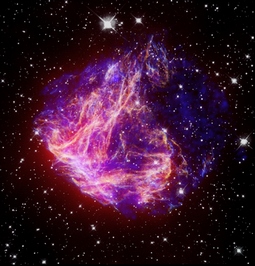Aurora is on version 2.5.0 C#, available at the Aurora Forums.
Contact Erik on the forum for a wiki account.
Survey
Survey missions are used to find Jump Points and Minerals. They are conducted by survey vessels equipped with specialized sensors capable of either detecting gravitational anomalies or the geological makeup of system bodies.
Geological Survey
Before you can start mining other bodies (planets, asteroids or comets), you have to complete a geological survey from orbit first. Surveying a body requires a vessel equipped with Geological Survey Sensors. An estimated 5% of all bodies contain minerals.
You can then send in a Geological Survey team of leaders with survey skills to look for mineral deposits the ships may have missed. The orbital search has be completed first, though.
Geology teams
- Geology Teams must be staffed by five Scientists and/or Officers with some degree of survey skill.
- The higher the team's skill, the faster they finish the survey. (The chance of completing a survey team check during one year is based on a combination of planet size and team skill. The formula is
(1000 / BodyRadius^(1/3)) * (TeamSkill / 100)) - The team's skill has no effect on what is found, only on how quickly the survey can be completed.
- While involved in their surveying efforts, members of the team may gain a small amount of experience and survey skill regardless of whether new deposits of minerals are discovered or not. Interestingly enough it seems that when one member of the team learns something, generally all 5 do.
- Ground based Geology surveys are limited only to bodies that have already been surveyed from space.
- Failure to find anything from space does not preclude the ground based team from finding minerals on bodies previously thought to be barren.
- When the team finally completes the job, new minerals are rolled for the body (with 25% of the normal chance to find minerals). For each mineral, if the new quantity is larger than the original quantity then the original quantity is set equal to the new quantity, and if the new accessibility is larger than the original accessibility then the original accessibility is updated to be the new accessibility. If this results in any changes, the team will report them.
In order to survey the mineral resources of a system body, a geological team only has to be dropped or created on the body. Dropping a geological team on a planet will automatically create a new colony if this planet was empty. Obviously, gas giants are not a valid destination. The survey will take place automatically, you don't have to give specific orders to your team.
Once the survey is done, the Geological Team Survey Completed field on the Economy screen (F2 Summary tab, will be set to 'Yes'.
Because the chance of both generating new minerals and finding that those minerals are better than the existing deposits is quite low, it's probably best to send geo teams only to those bodies where the total accessibility is quite high; even if they find new minerals on a body where none were detected before, it's quite unlikely to raise the total accessibility to something you'd be interested in mining.
The quality of the geo-sensor (normal, improved, advanced) and the skill of the team affect only the time required, not the chance of finding minerals. You can't get more than two chances of discovering minerals - one for the orbital search, one for the team.
Survey results
You will be notified when a system has been completely surveyed.
There are several ways to find out which bodies have been surveyed and what has been found:
- selecting "Show Surveyed Bodies" from the Minerals tab in the system map window. Here you can also see how much mineral reserves have been found, and their accessibility (i.e. possible mining rate).
- going to the System View window (F9): the first column shows either nothing (not surveyed yet), an "S" (surveyed but nothing found) or "M" (minerals present).
- the Geological Survey Report window provides a search function for minerals you've discovered.
Finallly, the Summary tab of the Population & Production window tells you whether a geo-team search on the colony has been completed yet.
Gravitational Survey
Before you can explore new systems, or find new routes between existing ones, you first need to find the Jump Points connecting them. Surveying a system requires a vessels equipped with Gravitational Survey Sensors.
You can see the surveyed and unsurveyed Survey Locations in a system by selecting "Show JP Survey Locations" from the Display tab in the System Map window. You will be notified when a system has been completely surveyed.
Default Survey Orders
On the second tab of the Task Groups window you'll find "Default Orders". Select "Survey Next Location" for grav survey, or "Survey Next Planet" (or moon, or asteroid, depending on what you want) for geo survey. These orders will be carried out whenever there's nothing else in the orders list. You will be noticed when the ships have surveyed all locations which fit their orders.
If you use "Survey Next 5 Bodies", instead of "Survey Next Body", they will survey multiple bodies per time increment. The five survey orders are created at once, just as if you had done them manually.
If you use "Survey Next 3 Locations", the gravitational survey ships will queue three locations instead of one resulting in slightly less micromanagement.

